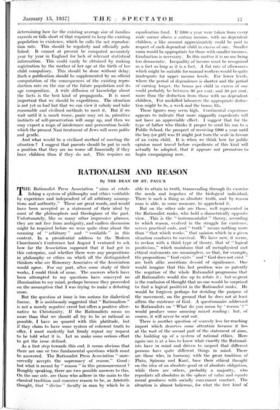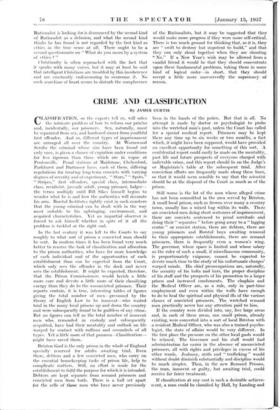RATIONALISM AND REASON
By THE DEAN OF ST. PAUL'S
THE. Rationalist Press Association " aims at estab- lishing a system of philosophy and ethics verifiable by experience and independent of all arbitrary assump- tions and authority." These are great words, and would have been accepted as a statement of their ideal by most of the philosophers and theologians of the past. Unfortunately,, like so- many other impressive phrases, they are not free from ambiguity, and endless discussion might be required before we were quite clear about the meaning of " arbitrary " and " verifiable " in this context. In a presidential address to the Modern Churchmen's Conference last August I ventured to ask how far the Association supposed that it had got in this enterprise, and whether there were any propositions in philosophy or ethics on which all the distinguished thinkers •who are Honorary Associates of the Association would agree. For my part, after some study of their works, I could think of none. The answers which have been attempted to my questions have conveyed no illumination to my mind, perhaps because they proceeded on the assumption that I was trying to make a debating score.
But the question at issue is too serious for dialectical finesse. It is assiduously suggested -that " Rationalism " is not a merely negative creed but offers a positive alter- native to Christianity. If the Rationalists mean no more than that we should all try to be as rational as possible, I have no quarrel with this platitude, but if they claim to have some system of coherent truth to offer; I must modestly but firmly repeat my request to be told what it is. Let us make some serious effort to get the issue defined.
As a first step towards this end, it seems obvious that there are one or two fundamental questions which must be answered. The Rationalist Press Association " unre- servedly accepts the supremacy of reason." Good : but what is meant by " reason " in this pronouncement ? Roughly speaking, there are two possible answers to this. On the one side, are those who adhere in the main to the classical tradition and conceive reason to be, as Aristotle thought, that divine " faculty in man by which he is able to attain to truth, transcending through its exercise the needs and impulses of the biological individual. There is such a thing as absolute truth, and by reason man is able, in some measure, to apprehend it.
But on the other side are those, well represented in the Rationalist ranks, who hold a diametrically opposite view. This is the " instrumentalist " theory, according to which reason, evolved in the struggle for existence, serves practical ends, and " truth " means nothing more than " that which works," that opinion which in a given situation conduces to survival. We have now, it seems, to reckon with a third type of theory, that of " logical positivism," which maintains that all metaphysical and ethical statements are Meaningless, so that, for example, the propositions " God exists " and " God does not exist " are both alike assertions devoid of significance. One would imagine that this last position was so patently the negation of the whole Rationalist programme that all Rationalists would rise up to refute it ; but so great is the confusion of thought that no one would be surprised to find a logical positivist in the Rationalist ranks. He would be forgiven perhaps for deriding the purpose of the movement, on the ground that he does not at least affirm the existence of God. A questionnaire addressed. to Rationalists on " What do you mean by ' reason' ? " would produce some amusing mixed reading : but, of. course, it will never be sent out.
There is another question of scarcely less far-reaching import which deserves some attention because it lies at the root of the second part of the statement of aims, the building up of a system of rational ethics. Here again one is at a loss to know what exactly the Rational- ists have in mind and driven to suspect that different persons have quite different things in mind. There are those who, in harmony with the great tradition of Plato, Spinoza and Kant, base their ethical thought on the idea of an absolute good or of absolute obligation, while there are others, probably a majority, who repudiate all absolutes in the sphere of value and equate moral goodness with socially convenient conduct. The situation is almost ludicrous, for what the first kind of Rationalist is looking for is denounced by the second kind of Rationalist as a delusion, and what the second kind thinks he has found is not regarded by the first kind as ethics in the true sense at all. There ought to be a second questionnaire on " What do you mean by a system of ethics ? "
Christianity is often reproached with the fact that it speaks with many voices, but it may at least be said that intelligent Christians are troubled by this incoherence and are constantly endeavouring to overcome it. No such searehini of heart seems to disturb the complacence of the Rationalists, but it may be suggested -that they would make more progress if they were more self-critical. There is too much ground for thinking that, as it is, they are " swift to destroy but impotent to build," and that they can only shout together when they are shouting " No." If a New Year's wish may be allowed from a candid friend it would be that they should concentrate upon these fundamental problems, taking them in some kind of logical order—in short, that they should accept a little more unreservedly the supremacy of reason.











































 Previous page
Previous page